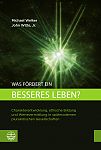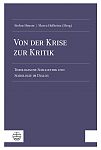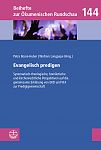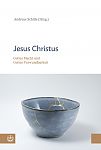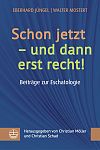Vol. 1: Observing Theology and the Transcultural
Matthew Ryan Robinson | Inja Inderst (Eds.)
»What Does Theology Do, Actually? Observing Theology and the Transcultural« is to be the first in a series of 5 books, each presented under the same question – »What Does Theology Do, Actually?«, with vols. 2–5 focusing on one of the theological subdisciplines. This first volume proceeds from the observation of a need for a highly inflected »trans-cultural«, and not simply »inter-cultural«, set of perspectives in theological work and training.
The revolution brought about across the humanities disciplines through globalization and the recognition of »multiple modernities« has introduced a diversity of overlapping cultural content and multiple cultural and religious belongings not only into academic work in the humanities and social sciences, but into the Christian churches as well.
[Was treibt Theologie eigentlich? Beobachtungen zu der Theologie und dem Transkulturellen]
»Was treibt Theologie eigentlich? Beobachtungen zur Systematischen Theologie und dem Transkulturellen« soll das erste in einer Reihe von fünf Büchern sein, welche alle unter der Titelfrage präsentiert werden, wobei sich die Bände 2 bis 5 auf jeweils andere theologische Disziplinen konzentrieren.
Dieser erste Band geht von der Beobachtung aus, dass nicht nur interkulturelle, sondern auch transkulturelle Perspektiven in der theologischen Arbeit und Lehre notwendig sind. Die Revolution, welche den Geisteswissenschaften durch die Globalisierung und die Erkenntnis »multipler Modernitäten« gebracht wurde, hat nicht nur in den akademischen Raum der Geistes- und Sozialwissenschaften eine Vielfalt sich überschneidender, kultureller Inhalte und multipler religiöser und kultureller Identitäten eingeführt, sondern auch in die christlichen Kirchen.
The What Does Theology Do, Actually? Project
What Does Theology Do, Actually? aims not to do theology, but to observe what theologies do--around the world today, in and for the communities in which they circulate and hold meaning. How is theology understood and practiced as a semantics of global society? What kinds of problems do theologies solve and how? These questions are pursued, moreover, with specific attention given to the »transcultural«. Much might be learned both about the role of Christian religion in public life and about evolving trends in theological understanding or praxis by examining comparatively the ways Christian communities encode transcultural experiences of irritation coming from their social environments (for example, nationalisms, protest movements, ethnic conflict, ecumenical and interreligious pressures, or global pandemics) into their self-understanding (for example, in engagement with received tradition or cultural heritage) and self-formation (for example, in liturgy and community ethics).
This requires theoretical open mindedness and methodological agility. The project therefore follows a two-step logic. First, the project seeks to observe theological work as itself a set of social discourses or objects contingently particular to certain contexts. A focus on answering the question »What is theology?« privileges those who already possess the resources and power to shape what counts as being »really« theology or not. By contrast, the descriptive approach preferred by the question »What does theology do?« objectifies »theologies« as a kind of social artifact and recognizes various forms of reflected religious communications as communicating theology. Second, in this way, the project aims to disrupt dominant paradigms in academic theological research, to expand the category of theological work(s) beyond textual formats and classroom or conference situations to include a variety of spaces, symbols, practices, and artifacts that function as transmitters of reflected religious communications, and to contribute to work diversifying theological methodologies to include empirical, qualitative, and quantitative research methods.

